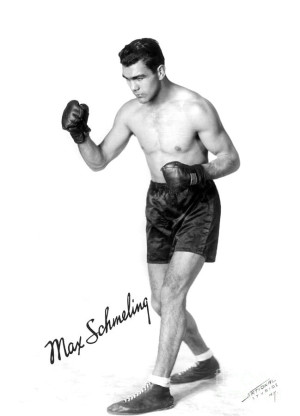Max Schmeling (Maximillian Adolph Otto Siegfried Schmeling)

Max Schmeling
Max Schmeling, the German heavyweight boxing champion who was miscast as a symbol of Adolf Hitler’s Nazi regime in his 1938 bout with Joe Louis, died in his native Germany. He was 99.
Schmeling, who became the first fighter to beat Louis in their 1936 meeting, died on Wednesday in the German town of Hollenstedt and was buried today in Lower Saxony, German Boxing Association President Bodo Eckmann said in a phone interview. The cause of death wasn’t given. A memorial will probably be held on Feb. 22 at Hamburg’s St. Michaelis church.
Nicknamed ”The Black Uhlan of the Rhine,” Schmeling won the world heavyweight crown in 1930 when Jack Sharkey was disqualified for a low blow at Yankee Stadium in New York. After one successful title defense, the German lost the belt to Sharkey in a rematch in 1932.
”Max Schmeling was an idol for generations of people,” German Chancellor Gerhard Schroeder said in a faxed statement. ”He didn’t only become a legend because of his unique boxing successes, as heavyweight world champion and all-class world champion. Above all, Max Schmeling was much appreciated inside and outside Germany as a human being and private person.”
Schmeling’s most notable rivalry was with Louis, who was a rising 22-year-old American contender when Schmeling knocked him out in the 12th round of a non-title bout. It set the stage for a rematch two years later at Yankee Stadium, where Louis, the ”Brown Bomber,” gained revenge with a first-round knockout.
World War II
The battles between Louis, a black man, and Schmeling came to symbolize for some the coming struggle between Hitler’s Third Reich and the Allies in World War II. Several Jewish groups tried to get the rematch canceled, and Louis said he was ”backing up America against Germany.”
Although Hitler had praised Schmeling after the first fight, Schmeling was not an admirer of the German leader and refused to join the Nazi party.
Louis angered Nazi officials by associating with German Jews and having an American Jewish manager. Schmeling, who served as a German paratrooper in World War II, later received an award from the International Raoul Wallenberg Foundation for risking his life to hide two Jewish brothers during Kristallnacht on Nov. 9, 1938, when Jewish homes, businesses and synagogues were attacked and destroyed by Nazis.
The boys, Henri and Werner Lewin, made their way to the U.S., where Henri became a hotel owner. Schmeling’s role in hiding the boys wasn’t known until Henri Lewin revealed it at a dinner honoring the former champion in 1989.
Good Nazi
”He risked his life for us; our lives weren’t worth a penny,” Lewin said in a 2002 interview with the Jewish Bulletin of Northern California. ”I said, `If this is a Nazi, he’s a good Nazi, but I want you to know one thing: I wouldn’t be sitting here today if it wasn’t for this Nazi.”’
After a huge buildup for Schmeling’s rematch against Louis, the bout lasted only 124 seconds. When Schmeling was knocked down for the third time, his corner threw in the towel before a cheering crowd of 70,000.
”To me and Schmeling, it was just best man wins, but we both knew what was at stake,” Louis said in his 1978 autobiography. ”To the world, Schmeling’s defeat foretold of things to come for Nazi Germany.”
Schmeling was born at Klien-Luckow, Uckermark, Brandenburg, Germany, on Sept. 28, 1905. He fought just five times after World War II and never got another title shot before retiring in 1948.
Last Fight
His last fight was a 10-round defeat by decision to Reidel Vogt in Berlin on Oct. 31, 1948, 24 years after his professional debut. His professional record was 56 wins, 10 losses and four draws, with 39 knockouts. He was the last German heavyweight champion.
After retiring from the ring, Schmeling purchased a Coca- Cola bottling and distribution franchise in Hamburg in 1948, the first in Germany after World War II, said Raquel White, a spokeswoman for Atlanta-based Coca-Cola.
Schmeling developed a friendship with Louis after their boxing careers ended and provided financial assistance to his former foe in the 1950s. He also paid for part of the funeral arrangements when Louis died in 1981 and was one of the pallbearers.
”It wasn’t until after World War II that I saw him again,” Louis said in his autobiography. ”We hugged each other and we’re real friendly and kept in touch by phone.”
Their friendship was portrayed in a 2002 television movie called ”Joe and Max.”
Schmeling married Czech actress Anny Ondra in 1933 and the couple remained together for almost 55 years until Ondra’s death in 1987. He appeared as a boxer in several movies, including a 1935 German film titled ”Knockout.”
Born
- September, 28, 1905
- Klein Luckow, Province of Pomerania
Died
- February, 02, 2005
- Wenzendorf, Germany
Cause of Death
- Natural causes
Cemetery
- Saint Andreas Friedhof
- Hollenstedt Harburger, Germany


